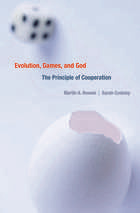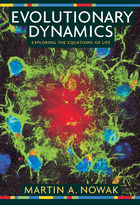
According to the reigning competition-driven model of evolution, selfish behaviors that maximize an organism’s reproductive potential offer a fitness advantage over self-sacrificing behaviors—rendering unselfish behavior for the sake of others a mystery that requires extra explanation. Evolution, Games, and God addresses this conundrum by exploring how cooperation, working alongside mutation and natural selection, plays a critical role in populations from microbes to human societies. Inheriting a tendency to cooperate, argue the contributors to this book, may be as beneficial as the self-preserving instincts usually thought to be decisive in evolutionary dynamics.
Assembling experts in mathematical biology, history of science, psychology, philosophy, and theology, Martin Nowak and Sarah Coakley take an interdisciplinary approach to the terms “cooperation” and “altruism.” Using game theory, the authors elucidate mechanisms by which cooperation—a form of working together in which one individual benefits at the cost of another—arises through natural selection. They then examine altruism—cooperation which includes the sometimes conscious choice to act sacrificially for the collective good—as a key concept in scientific attempts to explain the origins of morality. Discoveries in cooperation go beyond the spread of genes in a population to include the spread of cultural transformations such as languages, ethics, and religious systems of meaning.
The authors resist the presumption that theology and evolutionary theory are inevitably at odds. Rather, in rationally presenting a number of theological interpretations of the phenomena of cooperation and altruism, they find evolutionary explanation and theology to be strongly compatible.

At a time of unprecedented expansion in the life sciences, evolution is the one theory that transcends all of biology. Any observation of a living system must ultimately be interpreted in the context of its evolution. Evolutionary change is the consequence of mutation and natural selection, which are two concepts that can be described by mathematical equations. Evolutionary Dynamics is concerned with these equations of life. In this book, Martin A. Nowak draws on the languages of biology and mathematics to outline the mathematical principles according to which life evolves. His work introduces readers to the powerful yet simple laws that govern the evolution of living systems, no matter how complicated they might seem.
Evolution has become a mathematical theory, Nowak suggests, and any idea of an evolutionary process or mechanism should be studied in the context of the mathematical equations of evolutionary dynamics. His book presents a range of analytical tools that can be used to this end: fitness landscapes, mutation matrices, genomic sequence space, random drift, quasispecies, replicators, the Prisoner’s Dilemma, games in finite and infinite populations, evolutionary graph theory, games on grids, evolutionary kaleidoscopes, fractals, and spatial chaos. Nowak then shows how evolutionary dynamics applies to critical real-world problems, including the progression of viral diseases such as AIDS, the virulence of infectious agents, the unpredictable mutations that lead to cancer, the evolution of altruism, and even the evolution of human language. His book makes a clear and compelling case for understanding every living system—and everything that arises as a consequence of living systems—in terms of evolutionary dynamics.
READERS
Browse our collection.
PUBLISHERS
See BiblioVault's publisher services.
STUDENT SERVICES
Files for college accessibility offices.
UChicago Accessibility Resources
home | accessibility | search | about | contact us
BiblioVault ® 2001 - 2024
The University of Chicago Press









